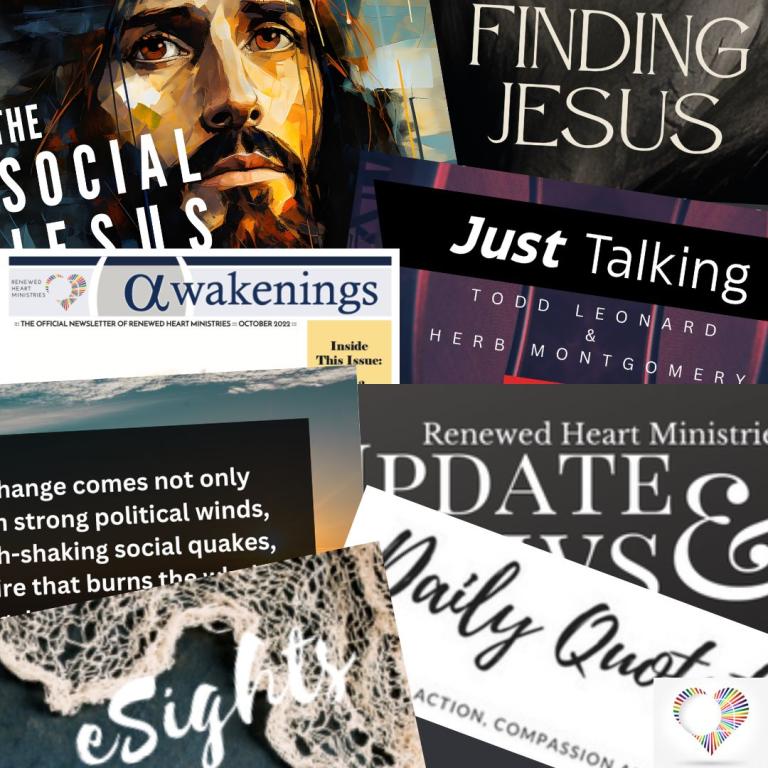
This week, our title is Refusing to Passively Endure Injustice and our reading this week is from the gospel of Mark:
Jesus and his disciples went on to the villages around Caesarea Philippi. On the way he asked them, “Who do people say I am?”
Welcome Readers! Please subscribe to Social Jesus Here.
They replied, “Some say John the Baptist; others say Elijah; and still others, one of the prophets.”
“But what about you?” he asked. “Who do you say I am?”
Peter answered, “You are the Messiah.”
Jesus warned them not to tell anyone about him.
He then began to teach them that the Son of Man must suffer many things and be rejected by the elders, the chief priests and the teachers of the law, and that he must be killed and after three days rise again. He spoke plainly about this, and Peter took him aside and began to rebuke him.
But when Jesus turned and looked at his disciples, he rebuked Peter. “Get behind me, Satan!” he said. “You do not have in mind the concerns of God, but merely human concerns.”
Then he called the crowd to him along with his disciples and said: “Whoever wants to be my disciple must deny themselves and take up their cross and follow me. For whoever wants to save their life will lose it, but whoever loses their life for me and for the gospel will save it. What good is it for someone to gain the whole world, yet forfeit their soul? Or what can anyone give in exchange for their soul? If anyone is ashamed of me and my words in this adulterous and sinful generation, the Son of Man will be ashamed of them when he comes in his Father’s glory with the holy angels.” (Mark 8:27-38)
I love it when the gospel lectionary readings are from one of the synoptic gospels. This passage in Mark gives us a lot to consider because this passage has been used for harm. As Jesus followers today, we can choose to let go of harmful interpretations to make room for more life-giving ones.
First, the claim that Jesus was the Messiah has long been used to harm our Jewish friends, family and neighbors. Before Christians used the title of Messiah against the Jewish community, who the Messiah was was an intra-tradition argument. What I mean is that Jewish voices within the Jewish community initially made the claim of Messiahship was in dialogue and sometimes debate with other Jewish voices. The earliest Jewish Jesus followers, even before the narrative events of his death and resurrection, had recognized something in Jesus’ teachings that gave them hope in Jewish renewal and restoration. That hope was originally a liberation hope within a larger oppressed community that was anything but monolithic. For them, Jesus’ teachings pointed to the same liberation they hoped for.
The community for whom the gospel of Mark was written recognized Jesus as Messiah and our reading this week was intended to affirm this recognition. There is something political for the early church deeper in this reading too. Naming Peter as the one who declares Jesus’ messiahship in this gospel narrative also affirms the community’s recognition of Peter’s authority among the other apostles in the early Jesus movement. Jesus as Messiah was not just an question for the Markan community. All of the communities after Jesus hotly debated which voices were to be recognized as authoritative. So this week’s passage is actually much more about Peter than it is about Jesus: it is only secondarily about Jesus’ messiahship, a tenet that this community already accepted. We should read this passage primarily as establishing Peter’s authority as one who recognized and affirmed the community’s belief in Jesus’ messiahship.
Whatever we make of the claim of Jesus’ messiahship today, we must be intentional about holding our interpretation in a life-giving way for all. We’ll take a look at those possibilities, next.
(Read Part 2)
Are you receiving all of RHM’s free resources each week?
Begin each day being inspired toward love, compassion, justice and action. Free.
Sign up at:
https://renewedheartministries.com/Contact-forms/?form=EmailSignUp















